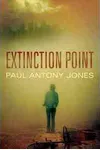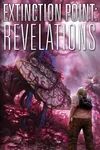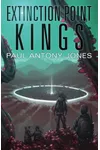Dive into the chilling, pulse-pounding world of the Extinction Point series, where a scarlet rain heralds the end of humanity and the rise of an alien Earth! Crafted by Paul Antony Jones, this post-apocalyptic saga follows Emily Baxter, a tenacious reporter navigating a world transformed by a mysterious red deluge and grotesque alien creatures. Blending science fiction, horror, and raw survival, Extinction Point hooks readers with its eerie premise and relentless suspense.
Picture this: one day, the skies bleed red, and life as we know it collapses in hours. That’s the gripping hook that sets Extinction Point apart, inviting readers to join Emily on a journey through a terraformed wasteland where humanity’s remnants fight for meaning. Ready to explore this haunting universe? Let’s venture into its origins, stories, and lasting allure.
How Extinction Point Began
Paul Antony Jones, a Cardiff-born sci-fi enthusiast now living near Las Vegas, channeled his love for scientific journals and fringe mysteries into the Extinction Point series. First self-published in 2012, the debut novel caught fire with readers, leading to a deal with Amazon’s 47North imprint. Inspired by apocalyptic classics like The Day of the Triffids, Jones envisioned a fresh take: what if an alien invasion didn’t just conquer but remade Earth entirely? His background as a reporter and copywriter lent authenticity to Emily’s voice, grounding the fantastical in gritty realism.
The Heart of Extinction Point
The series kicks off with *Extinction Point* (2012), where Emily Baxter, a New York journalist, survives a red rain that annihilates life on Earth. Alone with her wits and a bicycle, she faces alien creatures born from human remains, uncovering a terraforming plot. *Exodus* (2013) follows her northward trek to Alaska, guided by a scientist’s voice, as she battles a spreading red jungle. *Revelations* (2014) deepens the mystery of the rain’s origins, pushing Emily to humanity’s brink. *Genesis* (2015) introduces her son, Adam, the first post-apocalyptic child, whose eerie traits hint at alien influence.
Themes of survival, isolation, and humanity’s fragility weave through the series, set against a vividly alien New York and beyond. Jones’ descriptive prose paints a world of red forests and monstrous mutants, balancing horror with hope. Unlike zombie-laden apocalypses, Extinction Point’s unique alien invasion—where Earth’s ecosystem is rewritten—feels both scientific and otherworldly, earning praise for its originality.
The series’ style is a page-turning blend of suspense and introspection. Emily’s journey reflects on what it means to be human in a world no longer ours, making readers question our place in the cosmos. Her flaws, like stubbornness or naive decisions, make her relatable, while her resilience inspires.
Why Extinction Point Resonates
Extinction Point carved a niche in post-apocalyptic fiction by sidestepping clichés for a bold, alien-driven narrative. Fans on platforms like Goodreads laud its vivid world-building and Emily’s grit, though some critique its pacing or unresolved mysteries. Its influence lies in inspiring readers to embrace sci-fi’s weirder edges, blending horror with existential questions. The series’ cult following eagerly awaits a potential fifth book, teased by Jones’ open-ended finale in *Kings* (2017).
Its lasting appeal is its fearless imagination. By transforming Earth into an alien playground, Jones challenges readers to rethink survival and legacy. For sci-fi and horror fans, it’s a thrilling escape that lingers long after the final page.
- First published: 2012
- Books: 5 (*Extinction Point*, *Exodus*, *Revelations*, *Genesis*, *Kings*)
- Author: Paul Antony Jones, a self-described science geek
Grab *Extinction Point* and plunge into a sci-fi apocalypse where red rain rewrites reality. Will you survive Emily’s journey? There’s only one way to find out!


